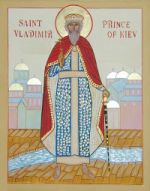Lent: About the Great Canon of Saint Andrew of Crete
During Lent we chant the Great Canon of Saint Andrew of Crete. The Great Canon was written towards the end of the 7th century. Its main purpose is to help us to become aware that our life is vanity and despondency if we forget God. It tries to make us understand that there is a big emptiness in us which is the desire of God, the desire to return to God, but that we have filled this emptiness with the pleasures of this world. Our soul has become divided: a vague nostalgia of paradise more and more strangled by the glaring lights of the pleasures of the flesh and of the mind.
We always say that we have plenty of time to repent, to return to God, to confess our shortcomings. Do we, in fact? How can we be so sure that we shall be alive in a few hours?
In the first century, it was common knowledge that once you were baptized, there were no room for sin. After baptism, perfect purity was expected from the new Christians. This is why many were waiting until their death bed to become Christians. The doctrine of the Church was not settled yet. A man was instrumental in the evolution of the doctrine of the Church on repentance. Hermas, the author of a book known as The Shepherd of Hermas, in the 1st century or early 2nd century. He wanted to answer the anxiety of the people when they learned that after they had sinned there was no earthly way to return to God. In the post baptismal penance, as he describes it, only God can remit sin, but this divine absolution is preceded by a preparation based on repentance and penance: a metanoia, which is a complete change of life. And during that time, people making penance had to wait for the permission to enter the church, and were not admitted easily to the Eucharist.
So we are given now the possibility to pay our debts to the Lord, to ask for His mercy. How do we do it? Don’t we see more often sloppiness and lukewarmness rather than zeal and fervour? Don’t we put first our own life with its private concerns and our petty selfish desires, needs and so-called necessities — before the life of the Church?
This is why we are dying. This is why there is no real life in our assemblies. This is why the Churches of God do not grow. We may be rich in traditions but we are no different from any group attached to its folklore; we may be rich in ideas but we are no different from an advertising agency; we may be rich in intellectual life but we are no different from any group of scholars; I could multiply the examples. As long as there is no interior spiritual life, we are a lifeless assembly.
Did Christ die in vain? We are in a special time in the year when we are asked with love and tenderness to become aware of our sins and of our need to change. Would Christ have died in vain — because we think that fasting is too hard. Because we find many excuses for not following the discipline of the fasting rules of the Church. At nights, our beds are defiled. We even cannot get away from entertainment for 7 weeks in the year.
The patience of God is infinite. It is infinite for those who are repenting. Are we? Or are we rather like dogs going back to their vomit?
The disease is an old one: the Tower of Babel, the tree in the garden of Eden. We think we are important; we want to be independent; we pamper ourselves; we refuse to give up certain things under many pretexts which are all good and valid but which are false under the eyes of God. The Canon of Saint Andrew calls it: self-idolatry. We have become our own idols with our own commitments. And these commitments seem to be more important than that which really matters: the Church of Christ. Florensky, in his letter on sin, underlines that sin is first of all to enclose one self in one’s own identity.
The Shepherd of Hermas says the same thing. We do not come first. The Church comes first. Our reality is not our life as an individual. Our reality is the Church. Or, the Church is the reality of man. Hermas compares the Church to a tower which is being built. It is a tower of stones. Square stones are required. We all are stones, more or less square. The round stones must be sized to fit the walls: They must change and get rid of some of their substance to fit the walls. The lesson is clear: Each of us is only just another stone in the wall. We share the sins of Manasseh, David and Ezechias and all the sinners of the earth; we are all responsible of the sins of each other; as one, in union with our forefathers, we are called to repent, change and confess our sins.
| о. Лука | < Предыдущая | Следующая > |
